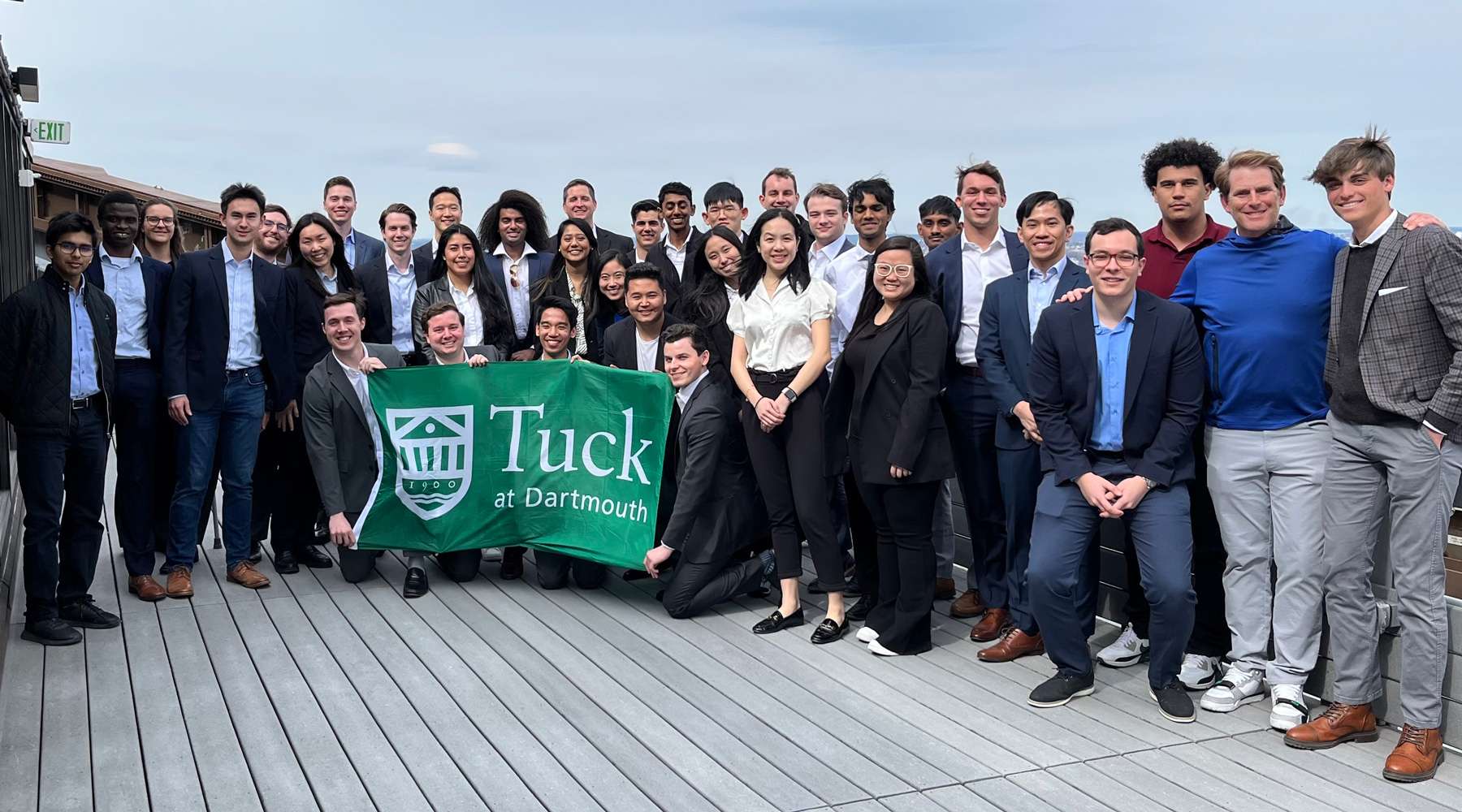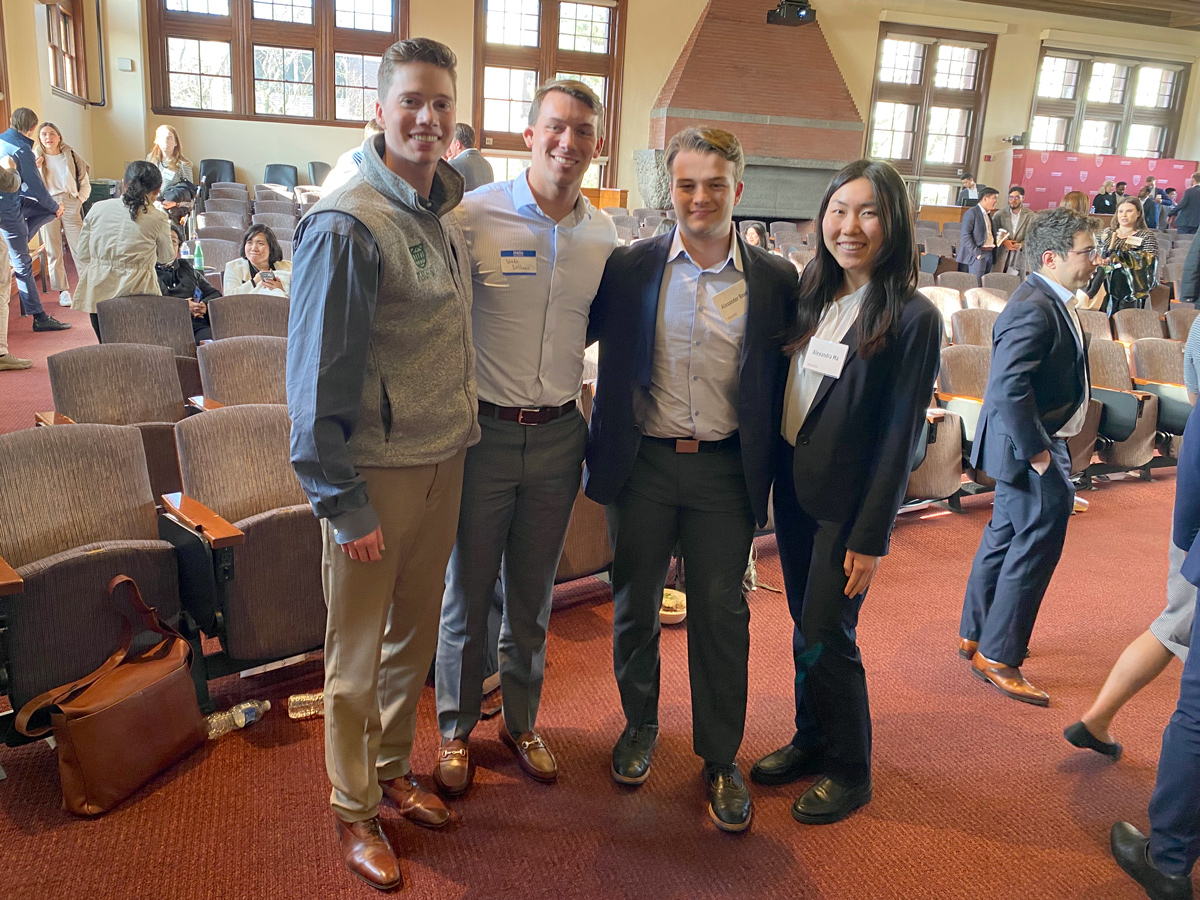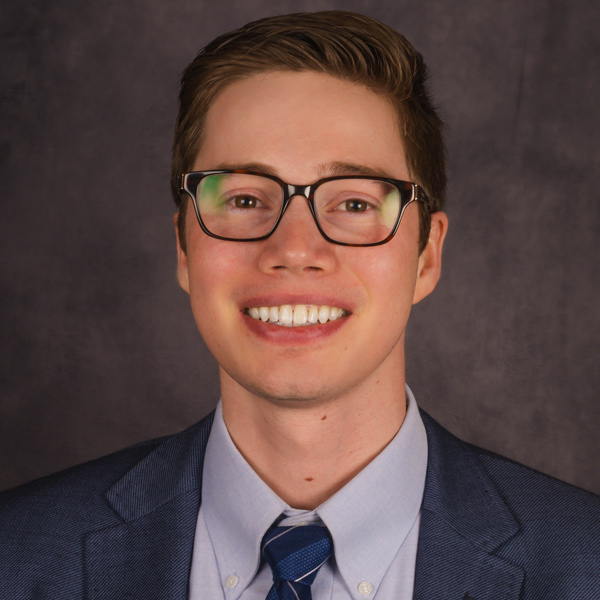
Rob Leet T’24, an incoming Real Estate Club co-chair, reflects on revitalizing the Real Estate Trek, which recently took place for the first time since 2019. 40 students traveled to eight firms in Boston to connect with Tuck alumni and learn more about breaking into the industry.
What motivated you to revitalize the Real Estate Trek?
Breaking into commercial real estate is tough. The recruiting process is “just-in-time” recruiting, which means that firms only hire when or if they see a need—and most firms delay their hiring until late in the spring term when most MBAs have a summer internship or full-time job already lined up. So, in real estate recruiting, there is a higher risk of waiting until springtime, and one constantly deals with peer pressure to find a job in an industry that has an earlier and more structured recruiting process.
The process of breaking into real estate is extremely networking-intensive and relationship-based. Most opportunities in the industry come from word-of-mouth and are not posted online. Therefore, forming strong relationships and building a robust network in the industry is key.
As a club, we thought organizing an all-day career trek in Boston would be the best way for students to tackle the unpredictable nature of real estate recruiting. They would get to develop meaningful connections in-person, learn from knowledgeable practitioners in the field, and plant a “seed” for building a network in the industry. We also wanted to build awareness about the industry and expose students to the wide variety of roles, property types, and investment strategies that are out there. Because real estate is an underrepresented industry at Tuck and at most MBA programs (where 2–3 percent of each year’s graduating class usually enters the field), we wanted to show our peers that the industry is so much more than one would normally make it out to be.

Can you tell us a bit more about the participants and agenda?
We initially marketed the event to both Tuck students and Dartmouth undergrads and were astounded by the amount of interest we received—over 90 students from the Dartmouth and Tuck communities were interested in attending. Actual turnout amounted to around 40 students (20 from Tuck and 20 from Dartmouth), but this number was still higher than what prior real estate treks experienced pre-COVID (which ranged from 10–15 students total).
We originally planned to have five company visits throughout the day. However, due to the large student turnout and limited capacity of several firms, we had to increase the number of visits to eight and split the group in two for the first half of the day. The companies that we visited included Beacon Capital Partners, Related Beal, Long Wharf Capital, Cabot Properties, Leggat McCall Properties, Arx Urban, Longfellow Real Estate Partners, and AEW Capital Management. At the end of the last visit, we hosted a Tuck/Dartmouth alumni happy hour at Samuel Adams Taproom Brewery. It was a great time! Many of the alums enjoyed reconnecting with their classmates as well.
Was there a particular highlight from the day that has stuck with you?
For me, there were two highlights: the visit to Longfellow Real Estate Partners, hosted by Jamie Peschel D’99, T’06, and the visit to AEW Capital Management, hosted by Manny del Campo T’19.
At the Longfellow visit, Jamie’s presentation not only touched on his work, but also offered general advice for finding happiness in life, and important lessons learned throughout his career. He started off the presentation by mentioning that he read every student’s resume (40 resumes!). He also spoke highly about liberal arts education at Dartmouth and the general management curriculum at Tuck, both of which he found incredibly valuable in bettering the world of real estate. He went on to describe the struggles that he experienced in trying to break into the industry, and finally, how he founded his own firm—which has since become the nation’s largest privately held life science real estate investor.
At the AEW visit, Manny put together a panel of three senior executives at the firm, including AEW’s chief investment officer and head of private equity, its COO, and its director and head of retail acquisitions. The panelists offered unique insights on the macro economy, the current state of real estate investment, and their expectations for 2023. Following the panel, Manny invited 20 of his colleagues from different lines of business to have breakout networking sessions. As opposed to what’s known as a “circle of death” conversation that’s typical in banking and consulting recruiting (where 10+ students circle around one company representative), the conversation ratio of students to AEW employees was excellent, at 2 to 1. This ratio allowed for much more intimate conversations. I appreciated Manny’s effort to convince so many of his colleagues and senior leaders to come in on a Friday afternoon—normally a work-from-home day at AEW.
What has your experience with Tuck alumni in the real estate industry been like?
While the quantity of Tuck students entering the real estate industry is small each year relative to other industries, the quantity of alumni certainly does not translate to the quality of alumni. I have found that Tuck real estate alums pull extra hard to help us land a career in the industry. This is likely because they know how hard it is to break into the industry given they went through the same process. The alums go out of their way to spend extra time in our networking conversations to help us understand industry trends, lingo, and develop technical skills. They offer high-quality referrals and introductions to other key contacts in the industry, which helps to grow our network. The alumni are also incredibly passionate about what they do and are very successful, which is an added bonus.
How do you hope to grow the trek and Real Estate Club during your time at Tuck? How has Tuck helped in this endeavor?
What I have enjoyed most about Tuck is its flexibility in supporting my interest in commercial real estate, which is not a common MBA career path. For example, another classmate and I are currently working with our real estate professor and an advisor at the Center for Private Equity & Venture Capital (CPEVC) on an independent study project. The project involves learning how large institutional funds analyze ESG-related real estate today, and how to incentivize institutional capital into more real estate ESG investments moving forward.
Apart from personal studies, one of my main goals at Tuck is to grow its real estate program. I am currently in discussions with two classmates and the CPEVC to organize a Real Estate Series for the 2023-24 school year. We are planning to invite Tuck and Dartmouth alums to campus to share their insight and advice about working in the industry. The visits may also include a mix of coffee chats, real estate case studies and modeling workshops, small group dinners, property sector overviews, moderated panel discussions, investment strategies, and the like. I am quite thankful for the partnership with CPEVC and how supportive the center has been in rallying behind our effort to grow the real estate program.
In addition to the Real Estate Series, I am working with the undergraduate real estate club and several Dartmouth alums to organize an all-day real estate conference at Tuck for the upcoming fall term. The conference will have multiple panel discussions throughout the day. We are still in the early stages of brainstorming but are very excited about this development.
The Tuck Real Estate Club is also already working on its next career trek for the 2023 fall term. As opposed to the Boston trek, the fall trek will be an institutional real estate trek to NYC. The NYC trek will focus on larger private equity “mega-funds” and other institutional players involved in commercial real estate investment and development.
Lastly, Michael Schwarze T’24, my fellow incoming Real Estate Club co-chair, and I want to bring diversity to the forefront of our Real Estate Series conversations next year. Commercial real estate remains one of the least diverse industries in the U.S. today, with over 90% of industry participants being white and male, and at the executive level, the number increases to 95%. We are planning to collaborate with Black Students at Tuck (BSAT) and Women in Business (WIB) for the 2023-24 school year to discuss this issue and ways to improve the industry moving forward.

Rob Leet T’24 is a first-year student at Tuck with experience in real estate and middle market commercial banking. Rob grew up in Seattle, majored in Norwegian and Economics at St. Olaf College in Minnesota, and worked in Sacramento and Seattle after graduating.
In his free time Rob enjoys hiking, skiing, swimming, and playing baseball. Outside of staying active, Rob likes to play board games, perform karaoke, play ping pong, and learn about coffee and espresso.